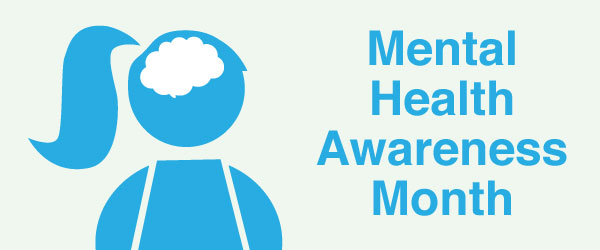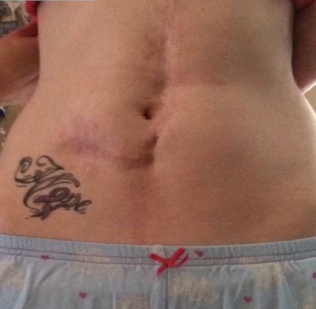Coping | IBD | Information

May is Mental Health Awareness Month! Over the past couple weeks, we’ve interviewed four of our Girls with Guts who volunteered to share thoughts on their own mental health journeys with our community. In an attempt to stay true to their own words, editing of their responses has been kept to a minimum. It’s tough to talk about mental health- the stigma surrounding it is still very much present, despite a slow increase in mental health-related conversations in the media and public life. Each young woman answered the same set of questions, and while it may seem repetitive, each post is a worthwhile read and great to share with family and friends who strive to understand the challenges of life as an IBDer. Over the next few weeks, please join me in showing some love and support for these four brave ladies: Rachel, Felicia, Kristen, and Angela. We hope that reading their stories will empower you to talk about your own mental health struggles with your family, friends, and medical team!
Did you struggle with mental health at all before your diagnosis?

RACHEL, 32, ULCERATIVE COLITIS and J-POUCH
I’ve struggled with mental health issues since I was a toddler. I had extreme OCD and anxiety. With the OCD, I had tics. I would stand up and down on the tips of my toes, strain my neck, and clear my throat or cough. I cleaned excessively. Every item had to always be in a certain place, and if anyone moved something, I’d get extremely upset.
How did diagnosis with a lifelong condition and the early stages of your illness affect your mental health?
I was diagnosed at the age of 15. I remember that when I got my diagnosis, my mom cried all the way home. I didn’t understand what was going on. I was in denial for a very LONG time. I would take my medicines as prescribed, but I didn’t get involved with my health. I remember being so embarrassed about the illness that no one except my family knew I had it. I still lived my life to the fullest extent. I went to college to train as a nurse and that kept me busy. I would lose a lot of blood, but never told anyone. The day I accepted my disease was when I was walking into college for a test and was feeling so bad I laid down on one of their couches. I called my mom to come get me and that was it for school. I mourned the loss of my school. I was angry at the disease for taking away all the hard work I had put into my college degree. I was continuously getting worse. My doctors refused to let me go back to school, so I applied for a full-times job. I was fired from one job because of my illness and had to leave another. My confidence in myself went down dramatically. That was when my mental status changed. After my surgeries, my brain just went crazy and I would later be diagnosed with bipolar 2.
What parts of IBD put the most strain on you emotionally?
Pain puts the most strain on me. I am constantly in pain. It’s caused me to have seizures and diarrhea and use a cane. When dealing with this pain, I will go into depression. I have a psychologist that is helping me deal with the depression associated with IBD. I’m easily agitated when having stomach issues and pain.
Do you find it difficult to explain to people on the outside that IBD affects your mental health, as well? Do you think they’re surprised to learn this?
It’s very hard to explain to people what IBD is like. I remember that even on the day of my surgery, some of my family asked the surgeon if there some other therapy that would cure this illness. I have very few friends now because I’ve had to cancel plans so much, and to them I look normal, so they didn’t understand how I could feel so bad when they said I was acting “normal”.
What sorts of things do you wish people understood about your struggles?
I wish people would understand how bad the pain gets and how fatigue can consume my life. I am on pain meds for IBD and arthritis, so that’s the biggest problem people stay on me about. Every time I take a pill I get asked “Do you really need that?” Also, they don’t understand the fatigue because to them it means you’re just tired.
When you’re having a tough day, what does that feel like? Look like to other people? Can they always tell?
My tough days usually make me feel like a burden to my family who, drive me to doctors appointments, stay with me at the ER etc. I feel out of control during a flare up which causes depression. My mom is the only one that can tell I don’t feel well. Other than her, everyone thinks I’m normal unless I tell them otherwise.
What sorts of things could the people in your life do to be the most supportive of you during tough days?
During my rough days I wish someone would just come over to take care of the chores, exercise my dogs, and just keep me company by doing just absolutely nothing. Also, I want people not to get upset if I have to cancel plans. I want them to be understanding of me canceling plans.
Who of your medical team is responsible for your mental health care? If you feel comfortable sharing, what sorts of medications/therapy are part of your treatment plan?
I see a psychiatrist and psychologist for medications and talk therapy, which helps a lot. I take Latuda, Paxil, Lamictal, Xanax, and Restoril for my mental health.
What non-medicinal things do you do that help you keep your mental health in check?
I use light therapy, coping skills that I have learned from my psychologist, meditation, exercise, and my puppies.
What do want to say to someone who might be struggling but not sure what to do?
Getting treatment for your mental health is vital. If you’re not a fan of therapists, find a psychologist. Therapists and psychologists are trained very differently, and I learned that finding a doctor of psychology makes a HUGE difference. Find activities that can lift your mood or help you not think of your illness. My therapist said give yourself 20 minutes a day to think about your illness. In those 20 minutes let yourself cry, but after the 20 minutes is up, put your illness worries in the back of your mind and don’t focus on them until the next 20 minute session. Using this technique has helped me to not feel so consumed by my illness all the time.

Rachel James was diagnosed with ulcerative colitis when she was 15. She was very embarrassed about her disease as a young adult. After her j-pouch surgeries in 2012 and finding Guts With Guts, she became outspoken about her illness, and received love and support in return. Rachel loves playing the piano, going to the movies with her husband, and playing with her two fur babies. She hopes that she can be a positive role model for others who are also sick with IBD or other chronic illnesses.
